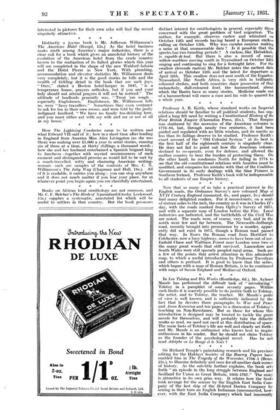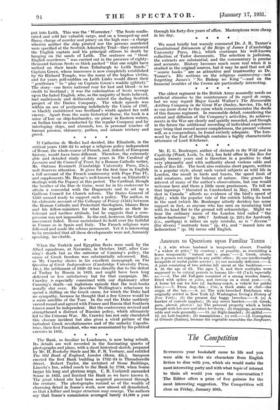Sir Richard Temple's painstaking research and his previous editing for
the Hakluyt Society of the Binerey Papers litve enabled him in The Tragedy of the Worcester, 1704-5 (Bettn, 25s.), to illumine definitely and once for all another dark corner of history. As the sub-title further explains, the book sets forth "an episode in the long struggle between England and Scotland -for Union as Great Britain, 1603-1707." The stdry is attractive in its own grim way. It relates how the Scots tank revenge for the seizure by the English East India Com- pail3r Of the last ship of the ill-fated Darien Company by seizing in their turn an English Indiaman (unconnected, how- ever, with the East India Company) which had innocently put into Leith. This was the 'Worcester.' -The Scots confis- cated and sold her valuable cargo, and on a trumped-up and flimsy charge of murder and piracy on the high seas—a charge wherein neither the ship pirated nor the persons murdered were specified at the Scottish Admiralty Trial—they sentenced the English captain and his principal officers to death by hanging on the sands of Leith. The sentence on "those English murderers" was carried out in the presence of eighty- thousand furious Scots so thick packed "that one might have walked on their heads from Edinburgh to Leith Sands." Captain Green, whose innocence is now completely established by Sir Richard Temple, was the name of the hapless victim, and for years golf-caddies on Leith Links would direct their "
gentlemen" to "play on Captain Green's wuddie (gibbet)." The story—one fierce national roar for loot and blood—is no credit to Scotland ; it was the culmination of Scots revenge upon the hated English, who, as the majority of Scots believed, had maliciously and deliberately ruined the darling Scottish project of the Darien Company. The whole episode was within an ace of postponing indefinitely the Union of 1707, so blackly embittered was Scotland's wrath against her auld enemy. Apart from the main historical theme, the book is a mine of lore on ship-husbandry, on piracy in Eastern waters, on Indian trade as conducted by the regular Company and by interloping ships, and abounds, too, in personal touches of human passion, chicanery, pathos, and satanic trickery and greed. * * * *





































 Previous page
Previous page